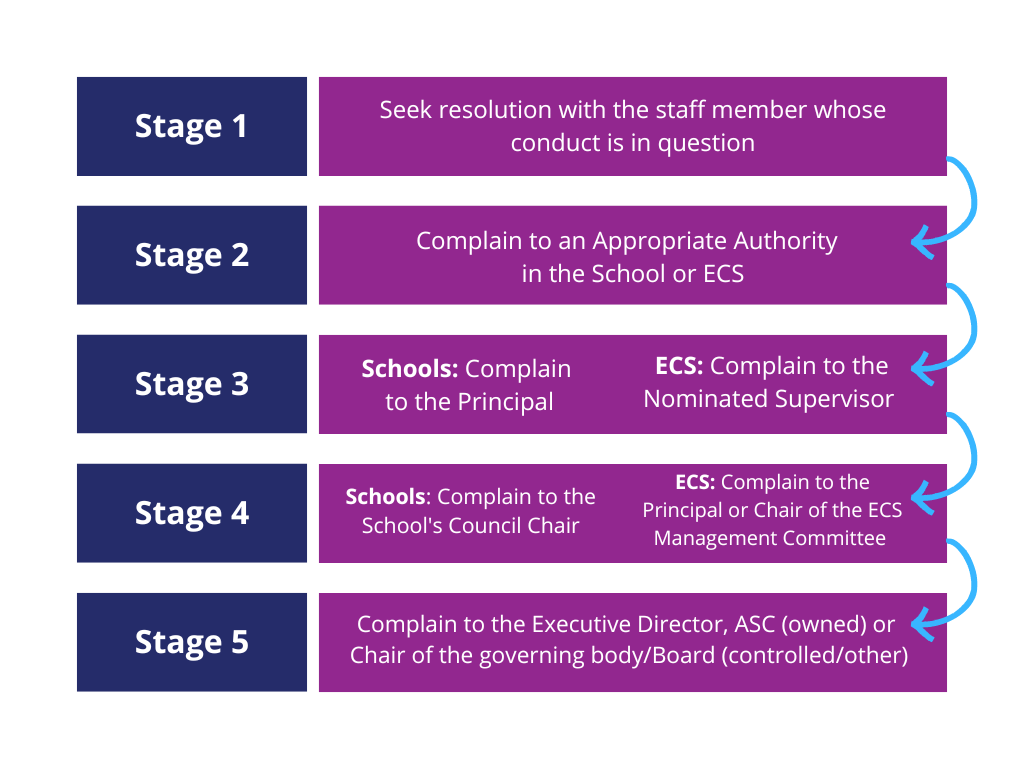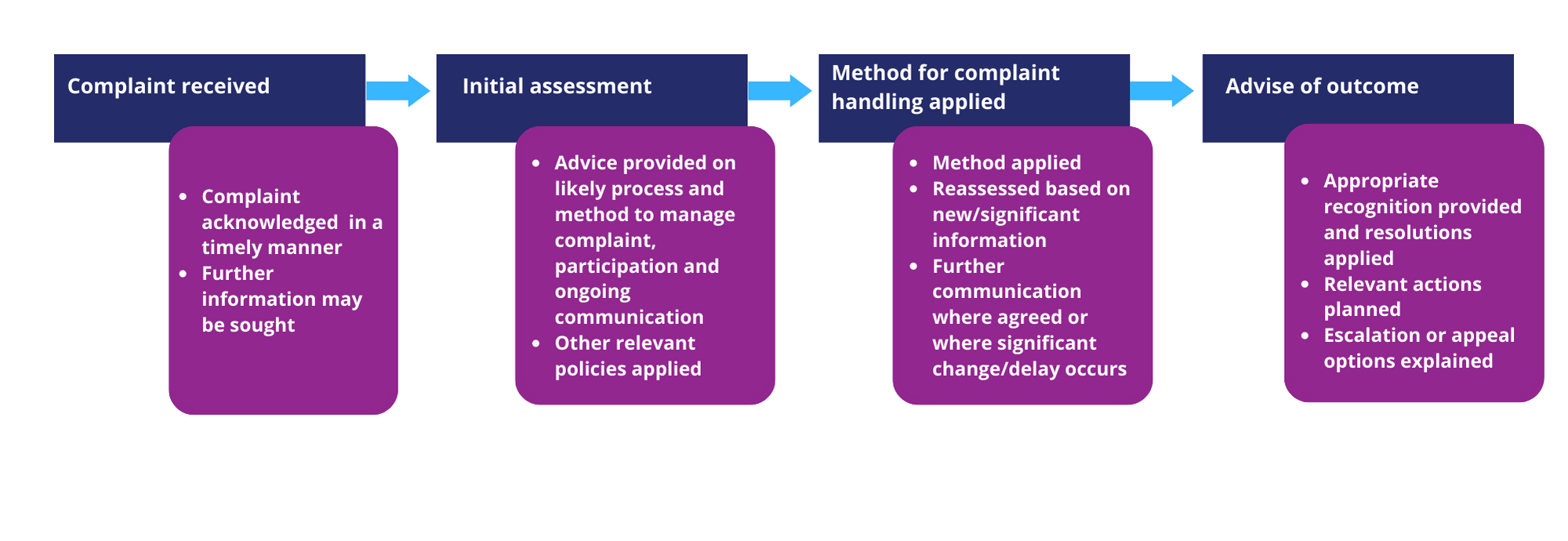The Anglican Schools Commission seeks to support a transparent, accessible, and effective process for managing complaints regarding Schools and Education & Care Services (ECS).
Reminder: ECS are often referred to as Kindergartens, Early Learning Centres, Pre-Prep, Outside Hours School Care or Vacation Care.
Who can make a complaint?
Complaints can be made by any person (the complainant), or by an authorised representative of the complainant.
Complaints can be made anonymously, however please note this may impact on the ability to address the content of such complaints.
Stages
Schools and ECS operate a staged approach to the management of complaints.
Please access local operating procedures at the relevant School or ECS for localised information on making a complaint.
In most circumstances, complainants, or their authorised representatives, are encouraged to commence their complaint by starting at stage one.
Stage two is an optional stage for each School and ECS due to varying organisational structures. This is appropriate where there are authorities in a School or ECS able to manage complaints prior to escalation to the Principal or Nominated Supervisor. Please refer to local operating procedures for details.
 Exclusions and considerations
Exclusions and considerations
- Complainant’s discretion: A complaint can progress to another stage if the complainant or their authorised representative is of the view that the earlier stage is not appropriate; or the complaint has not been addressed to their satisfaction
- Stage one is not to be used for complaints:
- about any person who is not a staff member (e.g. child, volunteer, or visitor).
- related to concerns for the safety of a child or young person
- related to an alleged breach of law (including regulations)
- Complaints are to escalate to stage 3 or further where:
- the complaint relates to Licensed Clergy or lay person
- it is reasonable to identify a strategic risk
- Complaints related to non-compliance with the Protecting Children and Young People in Anglican Education Policy are to be made in writing to:
- Executive Director, ASC (owned or controlled Schools, or where ACSQ is the Approved Provider of the ECS)
- Chair of the school’s governing body (e.g. Board) or ECS’ Approved Provider (other Schools and ECS)
When can a complaint be made to the Executive Director, ASC?
- Where the complainant determines an earlier stage is not appropriate or is dissatisfied with the response, a complaint can be made to the Executive Director, ASC, for:
- Schools owned by the ACSQ
- ECS where the ACSQ is the Approved Provider
Please note, this does not prevent the Executive Director forwarding to complaint to a Principal, Nominated Supervisor or Chair for their management, where this is assessed as an appropriate response.
2. Where the complaint relates to alleged non-compliance with the Protecting Children and Young People in Anglican Education Policy, the complaint is also to be directed to the Executive Director, ASC, for:
- Schools owned or controlled by the ACSQ
- ECS where ACSQ is the Approved Provider
How to make a complaint to the Executive Director, ASC
- Phone: (07) 3835 2288
- Email: asc@anglicanchurchsq.org.au
- Write: GPO Box 421, Brisbane, Qld, 4001
Information to provide in a complaint
- Complainant’s personal details: full name and preferred contact details
- Complainant’s authorised representative (where relevant) and their preferred contact details
- Any relevant identifying number, such as enrolment or account number
- Any request for special assistance or support to properly interact in the complaint’s process
- Whether the issue has been raised previously, and any response, for example, through an earlier stage
- Details of the complaint
- Details of any specific outcome sought
Supports
Complainants are encouraged to advise of any request for special assistance or support to properly interact with the complaint’s process. Where reasonable, every effort will be made to meet these requests.
Any complainant, witness, or person responding to concerns, can have a support person present during meetings regarding the complaint.
Overview of the complaints process
The complaints process seeks to be enabling, people focused, responsive, fair, and committed to both risk reduction and continuous improvement.
The process once a complaint is received is summarised as follows:
 Important notes
Important notes
- Where possible, people’s personal information, including identity, is kept confidential and privacy maintained. Of note, information may need to be shared where allowed to by law and necessary, for example, to effectively manage the complaint, or support the safety of persons or the successful operations of the School or ECS.
- It is expected that all persons involved in the complaints process show respect for and cooperate with each other. Unreasonable conduct of complainants, or their authorised representative, is behaviour which, because of its nature or frequency, raises substantial health, safety, resources or equity issues for the people involved; and is not acceptable. Examples, include unreasonable persistence, demands, lack of cooperation, arguments and behaviour. Whilst each complaint will be managed in a reasonable and fair manner, where conduct is assessed as unreasonable and likely to impact on a representative of the school, ECS or ASC’s health, safety or wellbeing, appropriate measures will also be taken.
- Complaints made do not limit the complainant’s ability to take action they consider appropriate in the circumstances, such as contact with an appropriate statutory authority; contact with a legal practitioner to obtain advice; or other action required or authorised by law.
- Whistleblowing is excluded from this process, and at times may be an appropriate alternative to making a complaint. The Whistleblower Policy for Anglican Education is appropriate where ACSQ owns a School or is the Approved Provider for an ECS. Other Schools or ECS, including those controlled by the ACSQ, have specific legal obligations and as such are responsible for having alternative whistleblower processes.
- Following progression through the stages of complaint and taking action in accordance with the Complaints Management in Anglican Education Policy, complainants can make an appeal to the Archbishop of the Diocese of Brisbane (ACSQ) or for other Queensland Anglican Schools or ECS, their respective Bishop (e.g. the Bishop of North Queensland). Please refer to the Policy and Procedures for further information.
- Definitions of key terms, used above, are provided in the Policy.
Further information
- The School or ECS’s local complaints information (located, for example, on their respective websites)
- Complaints Management in Anglican Education Policy
- Complaints Management in Anglican Education Guidelines & Procedures